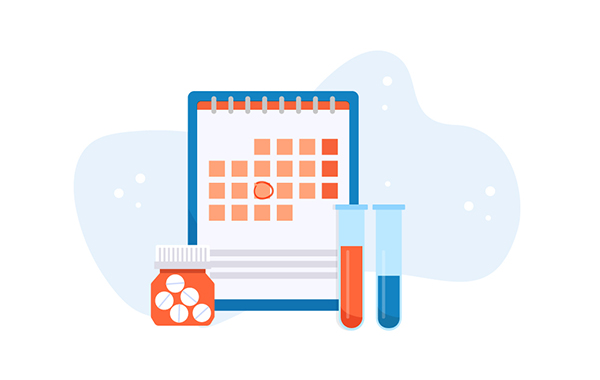When to Get Tested for STDs
Knowing when to get tested for STDs after a potential exposure can often times be confusing. We are here to help you know how soon to test after exposure for accurate results and what to expect from each type of STD test.
Find A Lab & Get TestedUnderstanding Window Periods for Accurate Results
To get the most accurate results from your STD test, timing matters. Each infection has a window period, the time between exposure and when a test can reliably detect the infection. Testing too early can result in false negatives, so understanding when to test is critical for your peace of mind and your health.
At Priority STD Testing, we use FDA-approved diagnostic methods designed for early and accurate detection. Here’s a breakdown of the recommended testing windows for each test we offer:
1. 4th Generation HIV Test (HIV 1/2 Antigen/Antibody)
- Detection Window: 2 to 6 weeks post-exposure
- Best Time to Test: 4 weeks for preliminary results; retest at 6 weeks or later for confirmation
- Why Timing Matters: This test detects both HIV antibodies and the p24 antigen, making it more accurate earlier than older generations of HIV tests.
2. HIV RNA Early Detection Test
- Detection Window: 9 to 11 days post-exposure
- Best Time to Test: 10 days for early detection; follow-up with 4th Gen test after 4 weeks
- Why Timing Matters: RNA testing detects the virus itself, not antibodies, making it the earliest HIV test available.
3. Syphilis Test (RPR – Rapid Plasma Reagin)
- Detection Window: 3 to 6 weeks post-exposure
- Best Time to Test: 6 weeks for most accurate results
- Why Timing Matters: Antibodies typically take several weeks to develop, especially in early syphilis.
4. Hepatitis B Surface Antigen (HBsAg) Test
- Detection Window: 3 to 6 weeks post-exposure
- Best Time to Test: 6 weeks or later
- Why Timing Matters: This test checks for the actual surface antigen of the virus, which appears shortly after infection.
5. Hepatitis C Antibody Test
- Detection Window: 6 to 9 weeks post-exposure
- Best Time to Test: 8 weeks or later
- Why Timing Matters: The body may take time to develop detectable antibodies. Retesting may be recommended if recent exposure is suspected.
6. Herpes Simplex Virus 1 & 2 IgG Antibody Test
- Detection Window: 4 to 6 weeks post-exposure
- Best Time to Test: 6 weeks or later for accurate IgG detection
- Why Timing Matters: IgG antibodies develop more slowly but provide a clearer picture of long-term infection. We do not use IgM testing, which is less reliable and not recommended by the CDC.
7. Chlamydia and Gonorrhea RNA TMA Test
- Detection Window: 2 to 6 days post-exposure
- Best Time to Test: 5 to 7 days after potential exposure
- Why Timing Matters: Our RNA-based transcription-mediated amplification (TMA) test detects the genetic material of the bacteria early, even before symptoms appear.
8. Trichomoniasis NAAT Test
- Detection Window: 5 to 10 days post-exposure
- Best Time to Test: 7 to 10 days
- Why Timing Matters: NAAT (nucleic acid amplification test) is the gold standard for detecting Trichomonas vaginalis, even in asymptomatic individuals.
General Testing Guidelines After Exposure
If you’ve recently had unprotected sex, a new sexual partner, or suspect exposure to an STD, follow these general rules:
- Test too early and you risk a false negative.
- Wait too long and you could unknowingly spread an infection.
- When in doubt, test at the earliest accurate window and retest after a few weeks if necessary.
For the most comprehensive screening, many people choose to test for all major STDs about 2 to 3 weeks after exposure, followed by a confirmatory test at 6 to 12 weeks, depending on the infections of concern.

ORDER
Purchase your lab order privately online or over the phone. The process is simple, quick, and secure. Our care counselors are available to answer any questions you may have or help schedule testing.
VISIT
Get tested same day at any of our 4,000 private locations, no appointment is needed after ordering. Our collection facilities are discreet, no other patients will know the reason for your visit.
RESULTS
Our test results are lightning fast and typically process in just 24-48 hours. You can access your results online through a secure patient login, or by calling one of our care counselors. Treatment options are available as well.
